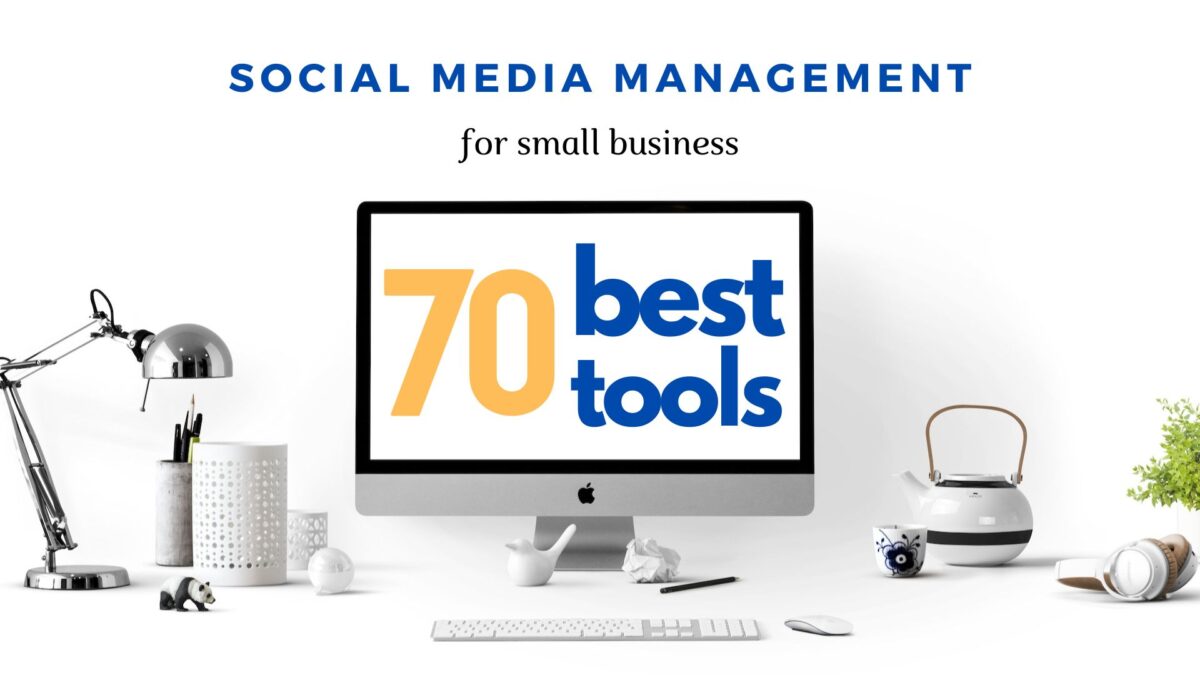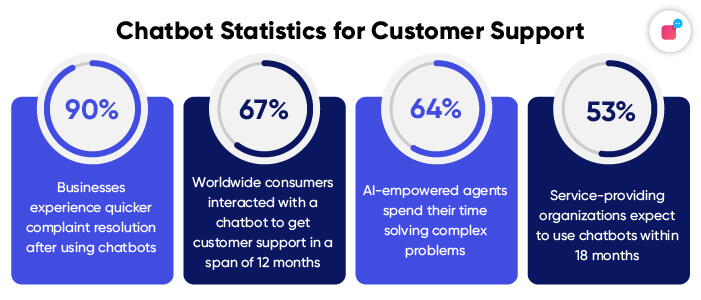Artificial Intelligence (AI) has become an essential part of modern business operations. It is a transformative technology that can help organizations grow, improve efficiency, and gain a competitive edge in today’s market.
AI tools can help businesses to automate processes, analyze data, and make predictions that lead to better decision-making.
The global corporate investment in artificial intelligence (AI) reached nearly $94 billion in 2021, reflecting a significant increase from the previous year.
In this post, we’ll explore 45 AI tools that can supercharge your business growth. We’ll cover various categories of AI tools, including social media, SEO, customer relationship management (CRM), business analytics, and process automation.
By the end of this post, you’ll have a good understanding of the different AI tools available and how they can help your business stay ahead of the curve.
So, let’s dive in!

AI Tools for Social Media
Maximizing Your Social Media Reach with AI
Social media has become an integral part of marketing strategies for businesses of all sizes. With AI-powered tools, businesses can maximize their social media reach and engagement, resulting in increased brand awareness and customer acquisition.
In this section, we’ll explore three categories of AI tools for social media.
1. AI-powered social media listening tools
Social media listening tools use AI to monitor social media channels for mentions of your brand, competitors, and industry trends. These tools analyze data to provide insights into customer sentiment, identify influencers, and track your brand’s performance. Some popular AI-powered social media listening tools include:
- Hootsuite Insights
- Brandwatch
- Sprout Social
2. AI tools for content creation and curation
Creating and curating engaging content is crucial for a successful social media strategy. AI-based content creation and curation tools use machine learning algorithms to analyze data and create personalized content that resonates with your target audience. Some popular AI-based content creation and curation tools include:
- Canva
- Lumen5
- Adobe Sensei

3. AI-driven social media advertising platforms
AI-driven social media advertising platforms use machine learning algorithms to optimize ad targeting, bidding, and delivery. These platforms analyze user data to deliver personalized ads to the right audience at the right time. Some popular AI tools for advertising include:
- Facebook Ads Manager
- LinkedIn Ads
- Twitter Ads
AI tools can help businesses improve their social media presence, engage with customers, and ultimately drive more revenue. By leveraging AI-powered social media listening, content creation and curation, and advertising platforms, businesses can stay ahead of the curve in today’s competitive social media landscape.
The global market revenues of AI in marketing are expected to grow rapidly from 27.4 billion U.S. dollars in 2023 to 107.4 billion in 2028, indicating the increasing adoption of AI technology in marketing.
AI Tools for SEO
Dominating Search Engines with AI
Search engine optimization (SEO) is a crucial aspect of digital marketing that helps businesses improve their online visibility and drive more organic traffic to their websites. With AI-powered tools, businesses can gain a competitive advantage by optimizing their SEO strategies.
In this section, we’ll explore three categories of AI tools for SEO.
1. AI tools for keyword research and analysis
Keyword research is the foundation of any successful SEO strategy. AI-powered keyword research and analysis tools use machine learning algorithms to analyze search trends and provide insights into high-value keywords that drive traffic and conversions. Some popular AI-powered keyword research and analysis tools include:
- Google Keyword Planner
- SEMrush
- Ahrefs
2. AI tools for content optimization
Creating high-quality, SEO-optimized content is critical for improving search engine rankings. AI-based content optimization tools use natural language processing (NLP) algorithms to analyze content and provide suggestions for improving readability, relevance, and keyword usage.
Some popular AI-based content optimization tools include:
- Yoast SEO
- Grammarly
- MarketMuse
3. AI-driven backlink analysis and monitoring tools
Backlinks are an essential factor in improving search engine rankings. AI tools for backlink analysis and monitoring use machine learning algorithms to analyze backlinks and identify high-quality links that drive traffic and improve search engine rankings. Some popular AI-driven backlink analysis and monitoring tools include:
- Moz Pro
- Majestic
- Ahrefs
AI tools can empower businesses to dominate search engines and attract higher organic traffic to their websites. By leveraging AI-powered keyword research and analysis, content optimization, and backlink analysis and monitoring tools, businesses can improve their SEO strategies and gain a competitive advantage in today’s digital landscape.
AI Tools for Customer Service
Enhancing Customer Experience with AI
Providing exceptional customer service is a critical component of any successful business. With AI-powered tools, businesses can enhance their customer experience and improve customer retention.
In this section, we’ll explore three categories of AI tools for customer service.
1. AI-powered chatbots and virtual assistants
Chatbots and virtual assistants use AI to automate customer support and provide personalized assistance to customers. These tools can handle routine inquiries, answer frequently asked questions, and provide real-time support. Some popular AI chatbots and virtual assistants include:
- Chatfuel
- Intercom
- Zendesk

2. AI tools for customer behavior analysis and segmentation
Understanding customer behavior is essential for providing personalized and relevant experiences. AI-based customer behavior analysis and segmentation tools use machine learning algorithms to analyze customer data and provide insights into customer behavior, preferences, and needs. Some popular AI-based customer behavior analysis and segmentation tools include:
- Salesforce Einstein
- IBM Watson Customer Experience Analytics
- Adobe Experience Cloud
3. AI tools for customer support and feedback
AI-driven customer support and feedback tools use machine learning algorithms to analyze customer feedback and provide actionable insights into areas of improvement. These tools can help businesses identify common customer pain points, track customer satisfaction, and provide personalized solutions. Some popular AI-driven customer support and feedback tools include:
- SurveyMonkey
- Qualtrics
- Medallia
AI tools can assist businesses in delivering outstanding customer experiences, enhancing customer satisfaction, and boosting customer retention. By leveraging AI-powered chatbots and virtual assistants, customer behavior analysis and segmentation, and customer support and feedback tools, businesses can stay ahead of the curve and meet the ever-evolving needs of their customers.

AI Tools for Business Analytics
Unlocking Business Insights with AI
Business analytics plays a crucial role in helping businesses make data-driven decisions, improve operational efficiency, and gain a competitive edge. With AI-powered tools, businesses can unlock hidden insights from their data and gain a deeper understanding of their operations.
The high tech and telecom industry heavily utilize artificial intelligence (AI) in service operations and product/service development, with 34% and 45% of respondents citing their usage, respectively. Similarly, the financial services industry relies heavily on AI for risk and service operations functions.
In this section, we’ll explore three categories of AI tools for business analytics.
1. AI tools for data visualization and reporting
Data visualization and reporting tools help businesses understand complex data and communicate insights effectively. AI-based data visualization and reporting tools use machine learning algorithms to provide intuitive visualizations and reports, making it easy to identify trends, patterns, and outliers. Some popular AI-based data visualization and reporting tools include:
- Tableau
- Power BI
- QlikView
2. AI tools for predictive analytics and forecasting
Predictive analytics and forecasting tools use AI to analyze historical data and make predictions about future outcomes. These tools can help businesses forecast demand, optimize pricing, and identify growth opportunities. Some popular AI-driven predictive analytics and forecasting tools include:
- IBM Watson Studio
- Google Cloud AI Platform
- DataRobot
3. AI-powered anomaly detection and fraud prevention tools
Anomaly detection and fraud prevention tools use machine learning algorithms to detect irregularities and anomalies in data that could indicate fraud or other issues. These tools can help businesses identify potential threats and take proactive measures to prevent them. Some popular AI-powered anomaly detection and fraud prevention tools include:
- Anodot
- Splunk
- RapidMiner
AI tools for business analytics can help businesses unlock hidden insights from their data, make data-driven decisions, and gain a competitive edge. By leveraging AI-based data visualization and reporting, predictive analytics and forecasting, and anomaly detection and fraud prevention tools, businesses can stay ahead of the curve and drive growth.
AI Tools for Process Automation
Streamlining Your Business Operations with AI
Businesses often struggle with operational inefficiencies that can lead to increased costs and decreased productivity. AI-powered process automation tools can help businesses streamline their operations, reduce costs, and improve overall efficiency. In this section, we’ll explore three categories of AI tools for automation.
1. AI-based process mapping and optimization tools
Process mapping and optimization tools help businesses visualize their operations and identify areas for improvement. AI-based process mapping and optimization tools use machine learning algorithms to analyze processes and suggest improvements, making it easier for businesses to streamline their operations. Some popular AI-based process mapping and optimization tools include:
- Signavio
- Pega
- UiPath
2. AI-driven robotic process automation (RPA) tools
Robotic process automation (RPA) tools use AI to automate routine and repetitive tasks, freeing up employees to focus on higher-value activities. These tools can help businesses improve efficiency and reduce costs. Some popular AI-driven RPA tools include:
- Automation Anywhere
- Blue Prism
- WorkFusion
3. AI tools for supply chain and logistics management
Supply chain and logistics management tools help businesses optimize their operations, improve efficiency, and reduce costs. AI-powered supply chain and logistics management tools use machine learning algorithms to analyze data and provide insights into supply chain performance, inventory management, and logistics optimization. Some popular AI-powered supply chain and logistics management tools include:
- SAP Ariba
- IBM Sterling Supply Chain Suite
- Oracle Supply Chain Management Cloud
AI tools for process automation can help businesses streamline their operations, reduce costs, and improve efficiency. By leveraging AI-based process mapping and optimization, robotic process automation, and supply chain and logistics management tools, businesses can stay ahead of the curve and drive growth.
Conclusion
In this post, we’ve explored five different categories of AI tools that can help businesses supercharge their growth. We’ve covered AI tools for social media, SEO, customer service, business analytics, and process automation. Each category provides a unique set of AI-powered capabilities that can help businesses optimize their operations, improve customer experience, and drive growth.
It’s essential for businesses to stay up-to-date with the latest AI technology to remain competitive in today’s rapidly evolving business landscape.
By incorporating AI tools into their operations, businesses can leverage the power of machine learning, natural language processing, and other AI technologies to improve efficiency, reduce costs, and unlock valuable insights.
We encourage you to try out some of the AI tools mentioned in this post and see the positive impact they can have on your business growth. Whether you’re looking to enhance your social media reach, dominate search engines, improve customer experience, unlock valuable insights, or streamline your operations, AI tools can help you achieve your goals.

Ali is a digital marketing blogger and author who uses the power of words to inspire and impact others. He has written for leading publications like Business2Community, Inc. Magazine, and Marketing Profs. When not writing, he enjoys spending time with his family.



